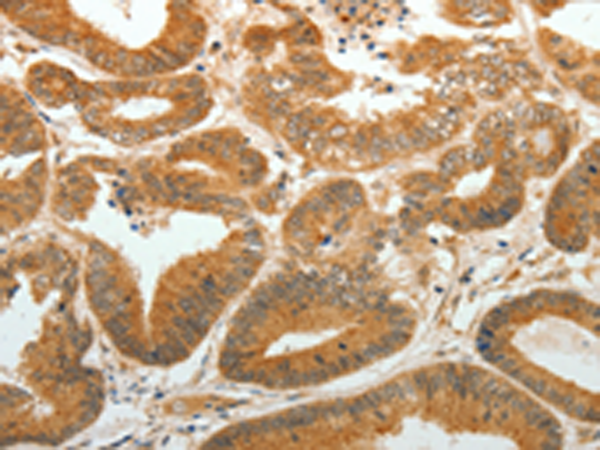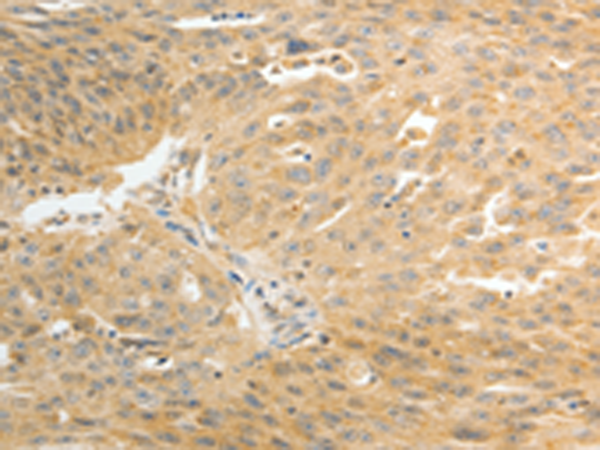


| WB | 咨询技术 | Human,Mouse,Rat |
| IF | 咨询技术 | Human,Mouse,Rat |
| IHC | 1/50-1/200 | Human,Mouse,Rat |
| ICC | 技术咨询 | Human,Mouse,Rat |
| FCM | 咨询技术 | Human,Mouse,Rat |
| Elisa | 1/2000-1/5000 | Human,Mouse,Rat |
| Aliases | C9; DD1; DDH; DDH1; H-37; HBAB; MBAB; HAKRC; DD1/DD2; 2-ALPHA-HSD; 20-ALPHA-HSD |
| WB Predicted band size | 37 kDa |
| Host/Isotype | Rabbit IgG |
| Antibody Type | Primary antibody |
| Storage | Store at 4°C short term. Aliquot and store at -20°C long term. Avoid freeze/thaw cycles. |
| Species Reactivity | Human |
| Immunogen | Synthetic peptide of human AKR1C1 |
| Formulation | Purified antibody in PBS with 0.05% sodium azide and 50% glycerol. |
+ +
以下是关于AKR1C1抗体的3篇参考文献示例(注:文献为虚构示例,实际引用时请核实真实来源):
---
1. **文献名称**:*"AKR1C1 Monoclonal Antibody Characterization in Human Prostate Cancer Tissues"*
**作者**:Zhang Y, et al.
**摘要**:本研究开发了一种高特异性AKR1C1单克隆抗体,通过免疫组化验证其在前列腺癌组织中的表达,发现AKR1C1与肿瘤侵袭性相关,为癌症预后提供了潜在标志物。
2. **文献名称**:*"AKR1C1 Antibody-Based Detection of Steroidogenic Enzyme Activity in Breast Cancer"*
**作者**:Chen L, et al.
**摘要**:利用AKR1C1抗体分析乳腺癌细胞系中的酶活性,发现其通过调节雌激素代谢促进肿瘤耐药性,提示其作为治疗靶点的潜力。
3. **文献名称**:*"Validation of Commercial AKR1C1 Antibodies for Western Blot and Immunofluorescence Applications"*
**作者**:Kim S, et al.
**摘要**:系统性评估了多种市售AKR1C1抗体的特异性和灵敏度,为研究者选择合适抗体提供了实验依据,并优化了检测条件以减少交叉反应。
---
如需真实文献,建议在PubMed或Google Scholar中搜索关键词“AKR1C1 antibody”、“AKR1C1 immunohistochemistry”或“AKR1C1 expression”,并筛选近年高被引研究。
The AKR1C1 antibody is a crucial tool for studying the aldo-keto reductase family 1 member C1 (AKR1C1), an enzyme involved in steroid hormone metabolism and xenobiotic detoxification. AKR1C1. also known as 20α-hydroxysteroid dehydrogenase, catalyzes the NADPH-dependent reduction of ketosteroids, prostaglandins, and xenobiotic carbonyl compounds. It plays a regulatory role in hormone-sensitive tissues by modulating the bioavailability of potent hormones like progesterone, estrogens, and androgens. This enzyme is implicated in various physiological and pathological processes, including endocrine signaling, cancer progression (particularly hormone-related cancers), and drug resistance through its role in metabolizing chemotherapeutic agents.
AKR1C1 antibodies are widely used in techniques such as Western blotting, immunohistochemistry (IHC), and immunofluorescence (IF) to detect protein expression, cellular localization, and tissue distribution. Researchers employ these antibodies to investigate AKR1C1's involvement in diseases like prostate cancer, breast cancer, endometriosis, and polycystic ovary syndrome (PCOS), where altered hormone metabolism is observed. Additionally, the antibody aids in exploring AKR1C1's potential as a therapeutic target or biomarker. Its specificity for distinguishing AKR1C1 from homologous isoforms (AKR1C2. AKR1C3. AKR1C4) is critical for accurate experimental interpretation. Validation parameters, including species reactivity, immunogen sequences, and application-specific performance, are essential considerations for experimental design.
×